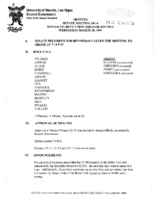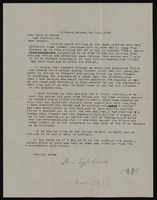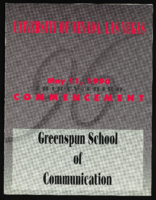Search the Special Collections and Archives Portal
Search Results
Phillip L. Cook oral history interview
Identifier
Abstract
Oral history interview with Phillip L. Cook conducted by Richard Strahan on March 3, 1977 for the Ralph Roske Oral History Project on Early Las Vegas. Cook first talks about his parents' move to Nevada and discusses how the school system has changed over time. He then describes the first businesses that opened up in the Downtown and Strip areas of Las Vegas, Nevada before discussing prostitution, Block 16, and recreational activities available to youth. Cook also talks about the first television sets and telephone systems made available, and he moves on to talk about the prices of things such as movies and haircuts when he was younger. The interview then moves to discussions on the Old Ranch, racial discrimination, school integration, the crime rate, and the school system in Las Vegas.
Archival Collection
Chris Lee oral history interview
Identifier
Abstract
Oral history interview with Chris Lee conducted by Cecelia Winchell and Stefani Evans on December 14, 2021 for Reflections: The Las Vegas Asian American and Pacific Islander Oral History Project.
Judge Chris Lee reflects on the lives of his parents, their occupations and experiences during the Korean War, and his family's decision to immigrate from Incheon, South Korea to Las Vegas. He recalls memories from his childhood visiting family in Korea, Korean traditions and food, his educational pursuits, and the livelihood of his parents after immigrating. Chris also shares details of his employment history as Deputy District Attorney for the Clark County District Attorney’s Office, as Deputy Secretary of State for Southern Nevada, as the first Asian American elected to the Clark County Justice Court bench, and presently as Judge in Department 1 of the North Las Vegas Municipal Court.
Archival Collection
UNLV Libraries Collection of Binion’s Horseshoe Hotel and Casino Promotional and Press Materials
Identifier
Abstract
The UNLV Libraries Collection of Binion’s Horseshoe Hotel and Casino Promotional and Press Materials includes clippings, press kits, press releases, and promotional materials dating from 1963 to 2004 for Binion’s Horseshoe Hotel and Casino in Las Vegas, Nevada.
Archival Collection
UNLV Libraries Collection of Peppermill Casinos Incorporated Promotional and Press Materials
Identifier
Abstract
UNLV Libraries Collection of Peppermill Casinos Incorporated Promotional and Press Materials includes clippings and promotional materials for Peppermill Casinos Incorporated properties in Reno, Nevada, Las Vegas, Nevada, and Mesquite, Nevada, dating from 1984 to 2007.
Archival Collection
Alan Copeland Music Scores
Identifier
Abstract
The Alan Copeland Music Scores are original handwritten music scores arranged by American composer Alan Copeland from approximately 1936 to 2004. Copeland worked with various musicians and groups, such as Les Brown, the Modernaires, and Sarah Vaughn.
Archival Collection

Transcript of interview with Freddie Glusman by Barbara Tabach, October 29, 2015
Date
Archival Collection
Description
In this interview Glusman discusses his early memories of being raised in Vancouver, Canada and how he ended up in Las Vegas. He reflects on how he first got his start in the town and his early dealings with casinos and their owners while he was working as a carpet and drapery salesman and while working for Fabulous Magazine. Glusman explains how he started his restaurant and tells about the people he encountered while doing this that where significant to both the Jewish community and Las Vegas as a whole. He recounts stories that include such people as Meyer Lansky, Al Sachs, and Moe Dalitz.
Text

Meeting minutes for Consolidated Student Senate University of Nevada, Las Vegas, March 30, 1994
Date
Archival Collection
Description
Text

Correspondence, Levi Syphus to Sadie George
Date
Archival Collection
Description
Text

University of Nevada, Las Vegas (UNLV) Greenspun School of Communication 33rd commencement program
Date
Archival Collection
Description
Commencement program from University of Nevada, Las Vegas Commencement Programs and Graduation Lists (UA-00115).
Text

Arturo Ochoa interview, April 9, 2019: transcript
Date
Archival Collection
Description
On the corner of Eastern and Stewart, inside the East Las Vegas Community Center, lies an oasis of creativity and art. The halls ring with the sound of harmonious music coming from the meeting rooms, where children move violin bows up and down in a synchronized motion. They stare with concentration at the music sheets in front of them. They gracefully play together and fill the empty halls with classical music. For most of them, they are the first in their family to learn how to play an instrument. Like many in their neighborhood, they are also first-generation Americans. The students are rehearsing for their recital with the Las Vegas Philharmonic at the Smith Center in a few weeks. In the back of the room there is a man gleaming with pride and joy. The Foundation to Assist Young Musicians (FAYM) provides the rehearsal space, violins, and music lessons at the community center and allows these children to flourish despite their economic, social, or racial background through, “Building
Text
